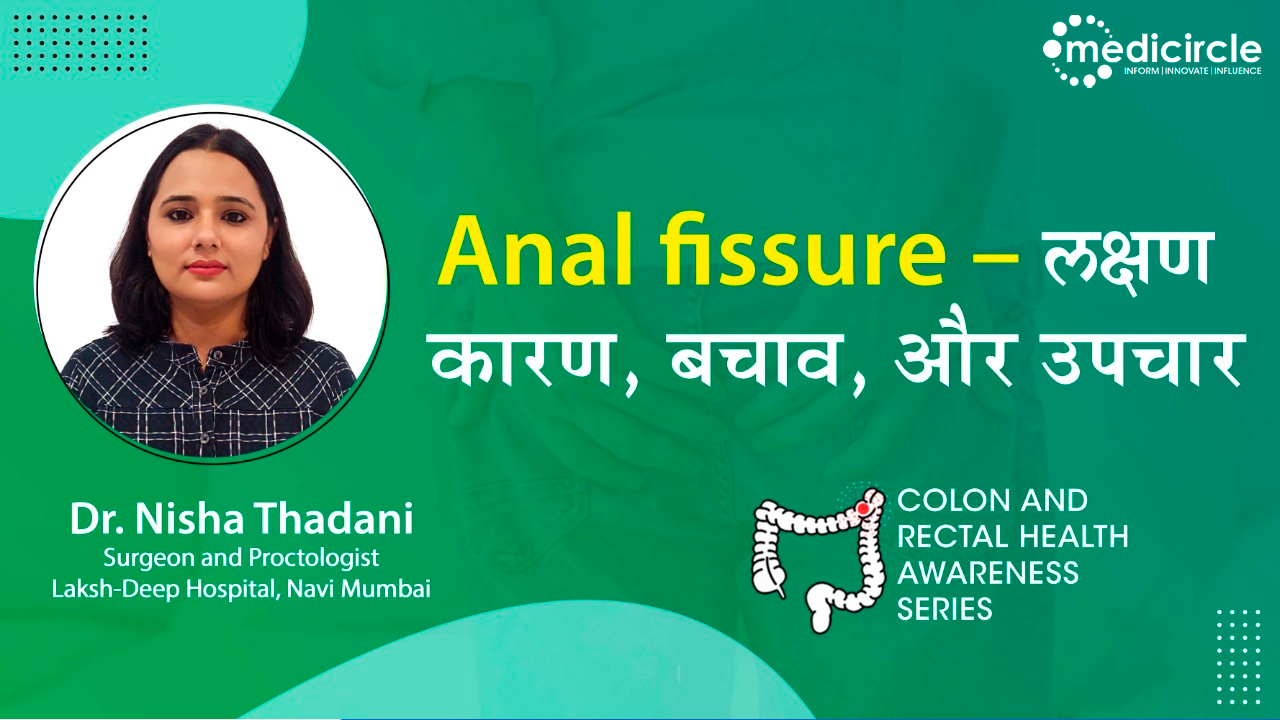Dr. Nisha Thadani is a Surgeon and Proctologist in Navi Mumbai and is currently practicing at Laksh-deep Hospital. For the past 8 years, she has been working as a Proctologist and Surgeon.
Anal fissures
An anal fissure is a tear or cut at the anal part from where we pass the stools. It is basically of two types – Chronic (if the patient’s symptoms are more than 6 weeks old) and acute (if the patient’s symptoms are less than 6 weeks).
Symptoms of anal fissures
- Severe pain in the anal region while passing motion and post-defecation also
- Severe burning in the anal region
- Bleeding
Causes of anal fissures
- Irregular bowel habits (if the patient is frequently constipated or passes hard stools)
- Improper diet
- Eating more junk food and less fiber diet
- Less hydration
- Staining on passing stools
Dr. Nisha explains, “Cases of anal fissures have been increased post-COVID primarily due to sedentary lifestyle, work from home culture, no physical activity, eating more junk food.
Preventing anal fissures
- Lifestyle modifications
- Consuming a fiber-rich diet
- Eating fewer bakery products, and processed food (maida)
- Doing more physical exercise
Treatment of anal fissures
"Anal fissures are very much curable without surgery. Anal fissures can be treated with a conservative diet. Patients need to modify their diet and take precautions for constipation. Patients need to alter his/her diet, consume a fiber-rich diet, and add salads to lunch and dinner. In addition to this, sitz bathing for 10 minutes helps relax anal muscles and some topical local applications can also be used. Laxatives are also helpful in this," adds Dr. Nisha.
Surgeries can be divided into three categories –
- Botox injection – It is not a permanent solution to the fissure. The injection helps to release the spasm.
- Lateral Internal Sphincterotomy (LIS) – It is a surgical procedure. This involves making a small cut in the anal sphincter muscle. It reduces pain and pressure, allowing the fissure to heal.
- Minimally invasive surgery – In this sphincter muscles are cut by laser fibre which causes less nerve fibre damage.
Points to remember
- There are high chances of fissures occurring again if the patient is not taking proper precautions regarding diet and lifestyle. If you are passing frequent hard stools and diarrhea, it can happen again. Post-surgery also can happen again. Patients have to consume a fiber-rich diet and avoid constipation and staining.
- Post anal fissure surgery, a patient can sit more comfortably.
- It is a minimally invasive procedure and heals faster. Post-operative pain is also very less.
(Edited by Renu Gupta)

 Post-COVID cases of anal fissures have increased dramatically. And this is primarily due to a sedentary lifestyle, work-from-home culture, no physical activity, and eating more junk food. Around half of the cases heal by themselves with proper self-care and avoidance of constipation. Let’s take a closer look at this with the help of an expert.
Post-COVID cases of anal fissures have increased dramatically. And this is primarily due to a sedentary lifestyle, work-from-home culture, no physical activity, and eating more junk food. Around half of the cases heal by themselves with proper self-care and avoidance of constipation. Let’s take a closer look at this with the help of an expert.




.jpeg)

.jpeg)

.jpeg)
_(1).jpeg)
.jpeg)

.jpeg)
_(1)_(1)_(1).jpeg)





.jpeg)

.jpeg)






.jpeg)
.jpeg)
